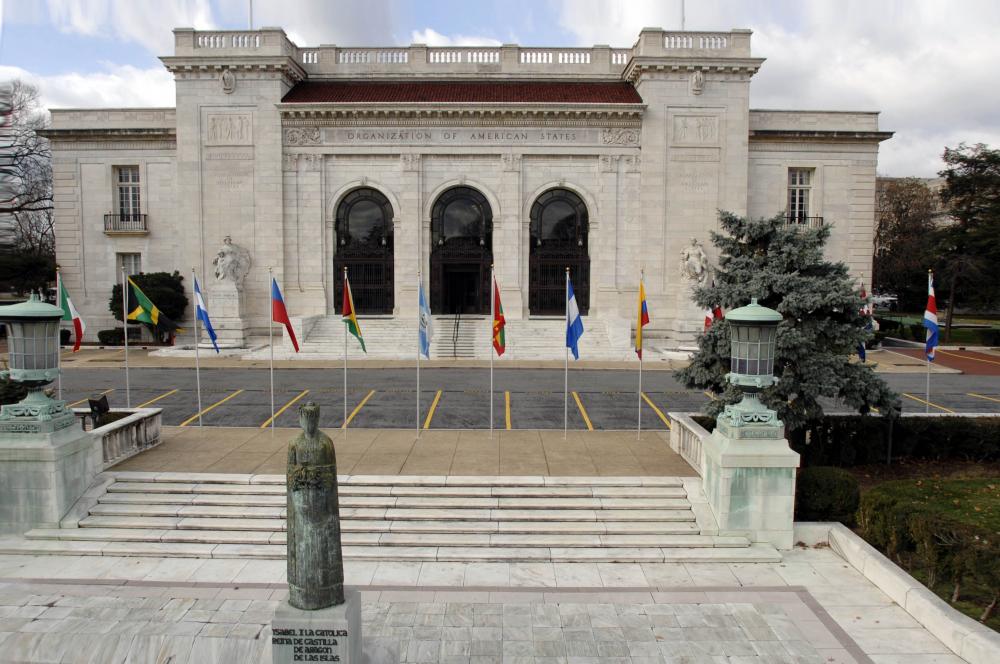At OAS Permanent Council meeting, Member States express decisive support for IICA actions

San Jose, 19 August 2020 (IICA). – Manuel Otero, Director General of the Inter-American Institute for Cooperation on Agriculture (IICA), gave a presentation on the 2019 Annual Report to the virtual Regular Meeting of the Permanent Council of the Organization of American States (OAS), detailing the actions of the specialist agency for agricultural and rural development. The presentation was met with strong approval from the Ambassadors and Representatives of the 34 Member States.
In the presentation, Otero outlined the priorities of his administration and the initiatives undertaken to modernize the institute. He also discussed IICA’s technical cooperation model, which seeks to ensure that the agriculture sector of the Americas achieves its full potential.
Moreover, given the turmoil and extensive social and production upheaval triggered by the pandemic, Otero, with the permission of Luis Fernando Cordero Montoya, the Honduran Ambassador to the OAS, who is the Chair of the Council, also discussed IICA’s actions over the last six months, when the hemispheric organization intensified its efforts and its delivery of technical cooperation services to address the needs of the countries.
The IICA Director General stressed that, “We have to bolster the production of food and agricultural products and to protect our farmers with good practices, particularly family farmers, while providing them with strategic inputs so that the agricultural cycle is not disrupted. We have to ensure proper market functioning and the prevention of protectionist measures, and must reaffirm support for international technical cooperation, seeking to reactivate agriculture as a strategic, innovative and resilient sector that promotes sustainable development”.
“IICA listens, proposes and acts”, he said, all of which has allowed it to make a decisive contribution to the convening of numerous ministerial, bilateral and hemispheric meetings and the establishment of consultation mechanisms involving governments, parliaments, international agencies, the private sector, universities and civil society organizations, to resolve or mitigate difficulties created by the pandemic, for the benefit of and in service to the countries.
In this vein, Otero spoke about the creation of innovative partnerships of benefit to farmers and of fostering development and inclusion in rural matters, emphasizing that last year alone, IICA implemented more the 300 actions to benefit the Member States.
At the end of the presentation, Graciela Scarnati Almada, Argentina’s Interim Representative to the OAS, lauded the Director General for his report, highlighting “the integrated planning, optimization of resources, reduced bureaucracy and transparency and responsibility” with which the hemispheric organization is being managed, adding that, “It has readily come to the assistance of those who have requested it, without disregarding its basic objectives, which are essential to the economic and social development of the region”.
Ambassador Fernando Simas Magalhães, Brazil’s Permanent Representative to the OAS, commended IICA and its Director General “for the valuable work that it is doing, which is benefitting all the countries in the Americas”, recalling that his country “is pursuing major technical cooperation initiatives with IICA and considers the work that the Institute is undertaking to be essential”.
Simas also reiterated “Brazil’s support for IICA’s actions and our confidence in the Institute’s capacity to act as a catalyst to galvanize the efforts of the hemisphere to maintain food security and to assist the entire regional agriculture sector at this time”.
On the other hand, Hugh Adsett, head of Canada’s Mission to the OAS, congratulated IICA “for its commitment to gender issues and for promoting the participation of women and young people in global and community rural development processes”.
For his part, Ambassador Hernán Salinas, Chile’s Permanent Representative, remarked that, “The report confirms the importance of creating a modern and efficient institution that capitalizes on opportunities to contribute to the development of the countries of the Americas”. He underscored “IICA’s efforts to provide biotechnology-related technical cooperation” to his country, to which it has “provided ongoing advice in terms of regulations and precision biotechnology”.
Chile’s Representative also explained that IICA “supported the country’s Ministry of Agriculture, in assessing 28 family farming cooperatives in La Araucanía. Similarly, its strengthening of resilient production capacities, through the establishment of demonstration plots, and validation of an intensive rice cultivation system are other effective projects that it developed in Chile and other States during this period”.
The remarks of Costa Rica’s Permanent Representative to the OAS, Ambassador Montserrat Solano Carboni, endorsed IICA as a valuable strategic asset of the Americas, stressing its “major importance in the development of strategies to create a resilient sector of benefit to youth and agriculture and in transferring knowledge about biotechnology, health, and technology, among other areas, to ensure the development of rural communities”.
“We celebrate the programs, projects, training and tools that IICA has provided to bolster our shared capacities”, said Ambassador Solano, “and to strengthen critical areas in the region, such as the bioeconomy, family farming, and the promotion of digital agriculture 4.0. We also welcome the strategic partnerships forged to successfully implement these initiatives”. She recalled that in 2019 her country had hosted significant meetings, such as that of the Inter-American Board of Agriculture (IABA), IICA’s highest governing body.
Solano mentioned that, “The Interpretive Center for Tomorrow’s Agriculture (CIMAG) was launched, in collaboration with Microsoft, and includes an Agricultural Innovation Laboratory created in partnership with our country’s Ministry of Science, Technology and Telecommunications (MICITT), thereby democratizing technology to further the development of the most vulnerable areas”.
Speaking on behalf of the Republic of Ecuador, Ambassador Carlos Alberto Játiva Naranjo, the country’s Permanent Representative to the OAS, described IICA’s “critical” role in “developing transformational solutions”, particularly at a time when “Covid-19 has increased the challenges that are afflicting our rural populations”.
In her comments, Christina E. Bruff, Interim Representative of the United States, advised that her country “welcomed” the report of IICA’s Director General, stating that, “We appreciate the tremendous work that it has accomplished, on the basis of agreements and a commitment to transparency and innovative, science-based rules”.
More information:
Institutional Communication Division
comunicacion.institucional@iica.int